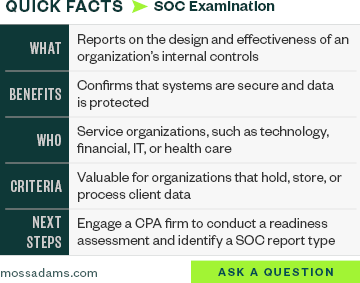Comparing SOC 2 and ISO/IEC 27001: Security Compliance FAQ

Protecting sensitive data is a top priority for organizations across industries. With the increasing frequency and sophistication of cyber-attacks, there’s a growing need for proactive measures that properly safeguard externally shared data.
A System and Organization Controls (SOC) 2® report and ISO/IEC 27001 certification are two of the most widely recognized mechanisms that help provide assurance over how an organization protects and safeguards data as well as its corresponding controls and processes around information security.
Explore what these two mechanisms are, how they can benefit your organization, and the challenges to consider when pursuing each of these and facing the respective assessments.
Learn more about the following:
- What’s a SOC 2 report?
- What’s ISO/IEC 27001 certification?
- What’s the Difference Between SOC 2 and ISO/IEC 27001?
- Why do SOC 2 and ISO/IEC 27001 matter?
- What are common challenges associated with SOC 2 and ISO/IEC 27001?
- How can you overcome compliance and audit challenges?
What’s a SOC 2 Report?
SOC 2 reports have a set of criteria developed by the American Institute of Certified Public Accountants (AICPA) for evaluating the effectiveness of a service organization's controls related to security, availability, processing integrity, confidentiality, or privacy. These reports are often used by service providers to demonstrate their commitment to security and compliance to their customers.
What’s ISO/IEC 27001 Certification?
ISO/IEC 27001 is an international standard that provides a framework for establishing, implementing, maintaining, and continually improving an information security management system (ISMS). It’s designed to help organizations manage and protect their information assets and is often used as a benchmark for security and compliance across industries.
What’s the Difference Between SOC 2 and ISO/IEC 27001?
Although SOC 2 and ISO/IEC 27001 share similar objectives, there are some notable differences between them. SOC 2 is primarily concerned with assessing an organization's controls over a defined system while ISO/IEC 27001 is focused on assessing conformity of an ISMS to the ISO/IEC 27001 standard. Additionally, SOC 2 reports are issued by a CPA firm, while ISO/IEC 27001 certification is awarded by accredited certification bodies.
The SOC 2 report is widely recognized in the United States, and its scope is specific to product or service offerings. The report includes system boundaries that outline processes, systems, and software used to support the in-scope product or service offerings.
There are two types of SOC 2 reports:
- Type I. Issued to attest to the design of controls at a point in time.
- Type II. Issued to attest to the design and operating effectiveness of controls for a defined period, usually a year.
ISO certification is granted over an ISMS, which encompasses all relevant products, people, processes, technology, and locations defined by the organization. ISO certifications are granted for three years after a successful certification audit and require annual surveillance audits.
SOC 2 reports focus on controls while ISO certification focuses on the management system and its processes.
Why Do SOC 2 and ISO/IEC 27001 Matter?
Both SOC 2 and ISO/IEC 27001 are designed to help organizations protect sensitive information and maintain the confidentiality, integrity, and availability of data. Organizations can consider both by undergoing an integrated audit to gain efficiency from overlapping domains.
Areas of Common Control Overlap
Both SOC 2 and ISO/IEC 27001 offer numerous benefits to organizations that implement them. For example, they can:
- Improve security posture and reduce the risk of data breaches and cyber attacks
- Increase customer confidence and trust by demonstrating commitment to security and compliance
- Meet regulatory requirements and industry standards
- Improve overall operational efficiency and reduce costs associated with security incidents
What Are Common Challenges Associated with SOC 2 and ISO/IEC 27001?
Implementing SOC 2 and ISO/IEC 27001 requirements can be time-consuming and resource-intensive, requiring significant investment in people, processes, and technology. Maintaining compliance with SOC 2 criteria and ISO/IEC 27001 requires ongoing effort and resources, which can be challenging for organizations with limited budgets or staff.
Common challenges often include:
- Resource constraints
- Siloed security organization structure
- Leadership misalignments
- Customer commitments
- Extended implementation timelines
Challenges associated with pursuing both include:
- Audit fatigue from overlapping audit requests and meetings
- Timeline coordination
- Multiple audit firm coordination, if separated
How Can You Overcome Compliance and Audit Challenges?
Obtaining both a SOC 2 report and an ISO/IEC 27001 certification is a significant commitment. Overcome common challenges and expedite the process with these tactics:
- Integrate ISO audit and SOC 2 examination to reduce audit fatigue
- Allocate appropriate resources to security efforts
- Integrate security concepts throughout organizational processes
- Maintain clear alignment of responsibilities
- Set realistic timelines
Both SOC 2 and ISO/IEC 27001 can help organizations protect their sensitive information and demonstrate their commitment to security and compliance. Despite their key differences, both offer long-lasting benefits to organizations implementing them.
We’re Here to Help
If you have questions about SOC 2 or ISO/IEC 27001 and how they can benefit your organization, connect with your Moss Adams professional.